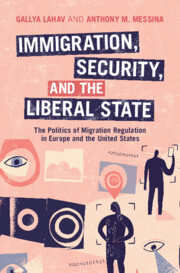 Immigration, Security, and the Liberal State
Immigration, Security, and the Liberal State Book contents
- Immigration, Security, and the Liberal State
- Immigration, Security, and the Liberal State
- Copyright page
- Epigraph
- Contents
- Figures
- Tables
- Preface and Acknowledgements
- 1 Introduction
- 2 Framing and Reframing Immigration
- 3 Expanding the Migration Policy Playing Field
- 4 Popular Attitudes towards Immigration Regulation
- 5 Immigration and the Politics of Threat
- 6 Securitizing and Politicizing Immigration
- 7 Conclusions
- References
- Index
3 - Expanding the Migration Policy Playing Field
Enlisting the Cooperation of Non-central State Actors
Published online by Cambridge University Press: 09 February 2024
- Immigration, Security, and the Liberal State
- Immigration, Security, and the Liberal State
- Copyright page
- Epigraph
- Contents
- Figures
- Tables
- Preface and Acknowledgements
- 1 Introduction
- 2 Framing and Reframing Immigration
- 3 Expanding the Migration Policy Playing Field
- 4 Popular Attitudes towards Immigration Regulation
- 5 Immigration and the Politics of Threat
- 6 Securitizing and Politicizing Immigration
- 7 Conclusions
- References
- Index
Summary
Chapter 3 identifies the numerous strategies the contemporary liberal states have pursued to navigate the cross-pressures engendered by the migration trilemma during the post-Cold War period, and especially since September 11th. Contesting scholarly claims that the liberal states cannot avert unwanted immigration, its main argument is that they have considerably reconciled the tensions inherent in the trilemma by enlisting and coopting non-central state actors at the intersection of human mobility and security. Specifically, they have forged bilateral and multilateral policy agreements and devolved many of their responsibilities for implementing immigration and human mobility policy to international, subnational and private sector actors. In pursuing this multifaceted course, the immigration policies of states have converged, and their burdens in managing their immigration-related responsibilities have been partially alleviated. But in doing so, the liberal norms inspiring their once steadfast commitments to maintaining relatively open borders and safeguarding citizen and immigrant rights have been compromised.
Keywords
- Type
- Chapter
- Information
- Immigration, Security, and the Liberal StateThe Politics of Migration Regulation in Europe and the United States, pp. 94 - 187Publisher: Cambridge University PressPrint publication year: 2024
